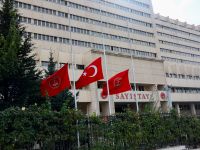Hundreds of thousands of tourists will flock to Ayia Napa this summer, seeking the ultimate clubland experience, but locals fear the dream mixture of sand, booze and sex is becoming a nightmare of drugs, violence and depravity.
Tacky neon signs light up this former fishing village on the south coast of Cyprus, enticing ravers to drink and dance till dawn, but underneath the glitz, one of Europe's clubland havens is seen by critics as Sodom and Gommorah revisited.
"We are invaded by the cheapest type of tourists who just want to get drunk and take drugs," Ayia Napa club barman Andreas Constantinou told AFP. "This is bad news for Cyprus."
"Cypriots are treated like second class citizens in their own country, we have become slaves to the krona, sterling and the mark," he added.
On a summer's evening the tiny central square is crammed with some 20,000 noisy young revellers seeking alcohol, thumping music, heaving clubs and a promise of sex with no strings attached.
Ayia Napa has replaced Spain's Ibiza as the Mediterranean's dance and party capital.
"There's a real buzz about the place," explains 19-year-old Curtis from South London.
Mini-skirted girls move around in packs from pub-to-bar-to-club on another endless search for the perfect night out, as scores of the opposite sex roam the streets swigging from bottles of vodka or pints of beer.
Of the expected record 2.7 million tourists to visit Cyprus this year more than half will visit Ayia Napa's sandy beaches and cutting-edge discos.
The latest official figures suggest Ayia Napa's cachet has boosted tourism by 15.2 percent for the first six months of 2000 from a year earlier.
But the strains on a small community whose permanent residents number barely 3,000 is beginning to take its toll.
Locals increasingly complain of loutish and obnoxious behaviour causing tension among Cypriots and tourists.
British tourists "urinate wherever they see fit," one local businessman told AFP. "We are fed up with this and other hooligan behaviour."
People in the tourist industry resent the new wave of image-tarnishing tourists and hark back to the days when Ayia Napa could be promoted as a "crime free" family destination.
"Most tourists who check in to the hotel stay out all night and come back drunk. If you visit the pool at midday it's empty because most clients are sleeping off a hangover. It wasn't like this, but these are the types we are getting now," said one hotel employee.
Private security at many hotels, deemed unnecessary a few years ago, is now common.
There are fears that younger and rowdier crowds will scare the older, wealthier visitor away, even in the so-called "quality tourism" period outside July and August.
The authorities concede that Ayia Napa has become the centre for the island's trade in the amphetamine-based drug ecstasy, mostly smuggled in by tourists, who bring both enough for their own use and to sell to pay for their holiday.
"Supplying ecstasy in Ayia Napa is big business for the dealers, and we are doing our best to cope, but we are severely understaffed," an Ayia Napa drug squad officer told AFP.
The first seven months of this year saw nine cases in which 1,417 ecstasy tablets were seized in Cyprus, which has a zero tolerance drugs policy,, compared to 10 cases involving only 63 pills for the whole of 1999.
Last year, only 30 percent of cases concerned Ayia Napa, as opposed to 75 percent so far this year.
Four years ago, ecstasy pills were unheard of on an island priding itself on being a relatively safe society, where public disorder among Cypriots is rare.
National concern was reflected in a series of front page articles in local newspaper Politis calling Ayia Napa a den of drug taking and public orgies that were an "affront to the moral decency of all Cypriots".
The authorities were urged to restore law and order in the "town of shame".
Tourism Minister Nicos Rolandis replied that he wanted tourist police patrolling the streets of Ayia Napa, though he dismissed claims that the place was a disgrace and a law unto itself.
"We can't force tourists to only visit archaelogical sites," he said.
Ayia Napa municipality said reports of sex and drunkenness were exaggerated, but called for extra police to combat rising incidents of public disorder.
The serious stabbing of a British tourist on Ayia Napa's teeming Nissi Beach in July, tales of sex cruises and the jailing of five British tourists for ecstasy possession earlier this month threaten an economy heavily reliant on tourism.
The death, also in July, of a British tourist in nearby Paralimni, after apparently taking five ecstasy tablets in quick succession, fuelled the concern.
But regional police chief Charalambous Argyrou insisted that the situation is not getting out of hand and that the police presence in the area is sufficient.
"We use a low key approach but enforce a no-tolerance policy to troublemakers, we have things under control," he said.
"British tourists are a problem, but without them we couldn't earn a living wage," taxi driver Panayiotis Panayiotu added -- AYIA NAPA, Cyprus (AFP)
© 2000 Al Bawaba (www.albawaba.com)








